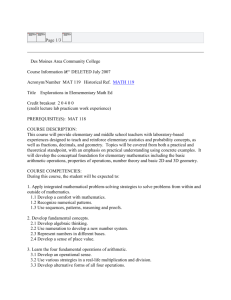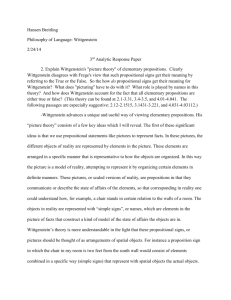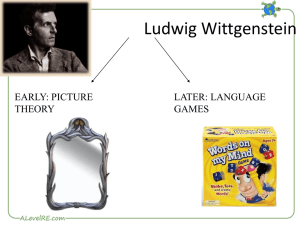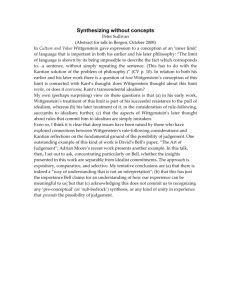Wittgenstein on mathematics and games
advertisement
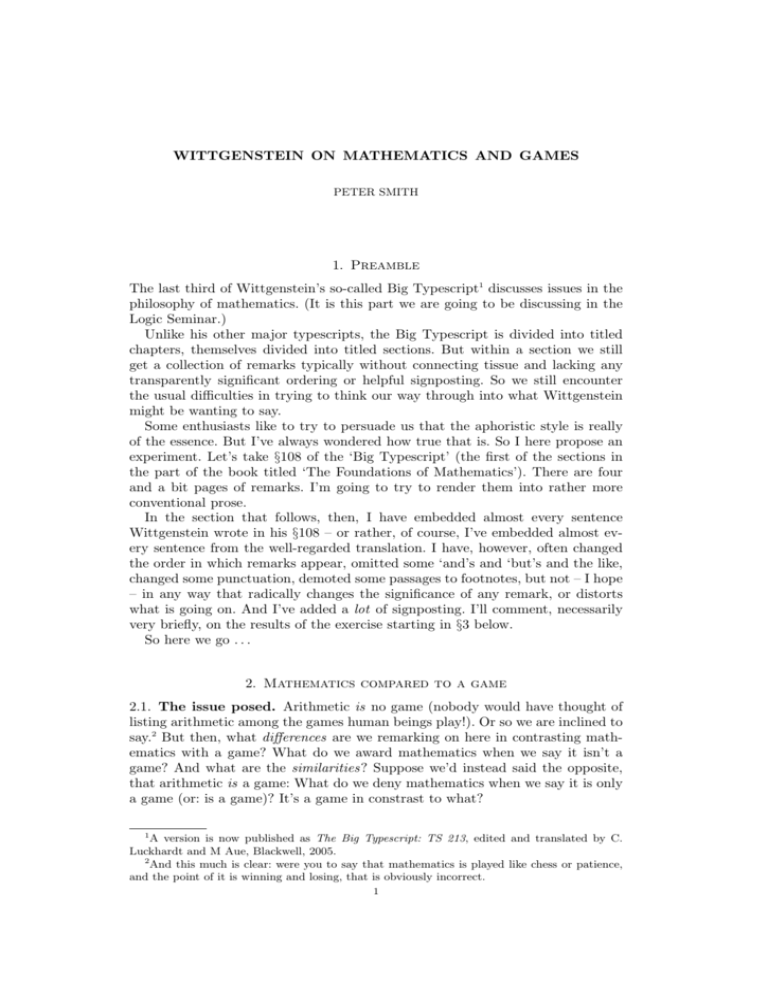
WITTGENSTEIN ON MATHEMATICS AND GAMES PETER SMITH 1. Preamble The last third of Wittgenstein’s so-called Big Typescript1 discusses issues in the philosophy of mathematics. (It is this part we are going to be discussing in the Logic Seminar.) Unlike his other major typescripts, the Big Typescript is divided into titled chapters, themselves divided into titled sections. But within a section we still get a collection of remarks typically without connecting tissue and lacking any transparently significant ordering or helpful signposting. So we still encounter the usual difficulties in trying to think our way through into what Wittgenstein might be wanting to say. Some enthusiasts like to try to persuade us that the aphoristic style is really of the essence. But I’ve always wondered how true that is. So I here propose an experiment. Let’s take §108 of the ‘Big Typescript’ (the first of the sections in the part of the book titled ‘The Foundations of Mathematics’). There are four and a bit pages of remarks. I’m going to try to render them into rather more conventional prose. In the section that follows, then, I have embedded almost every sentence Wittgenstein wrote in his §108 – or rather, of course, I’ve embedded almost every sentence from the well-regarded translation. I have, however, often changed the order in which remarks appear, omitted some ‘and’s and ‘but’s and the like, changed some punctuation, demoted some passages to footnotes, but not – I hope – in any way that radically changes the significance of any remark, or distorts what is going on. And I’ve added a lot of signposting. I’ll comment, necessarily very briefly, on the results of the exercise starting in §3 below. So here we go . . . 2. Mathematics compared to a game 2.1. The issue posed. Arithmetic is no game (nobody would have thought of listing arithmetic among the games human beings play!). Or so we are inclined to say.2 But then, what differences are we remarking on here in contrasting mathematics with a game? What do we award mathematics when we say it isn’t a game? And what are the similarities? Suppose we’d instead said the opposite, that arithmetic is a game: What do we deny mathematics when we say it is only a game (or: is a game)? It’s a game in constrast to what? 1 A version is now published as The Big Typescript: TS 213, edited and translated by C. Luckhardt and M Aue, Blackwell, 2005. 2 And this much is clear: were you to say that mathematics is played like chess or patience, and the point of it is winning and losing, that is obviously incorrect. 1 2 PETER SMITH 2.2. Do mathematical propositions express thoughts? A natural first response to our questions is to say of mathematics (as opposed to a game) that its propositions make sense, having meaning, express thoughts. But what does that actually mean? We can fall into two temptations here. First, we can be tempted by the picture of a meaning as a special kind of entity – the sense outside the proposition, so to speak. But what good will such a ‘thing’ do for us? What concern is it of ours? Where does it manifest itself and what can we do with it? If we want to know the sense of a proposition, we don’t want to be given a thing – in fact the question “what is the sense of this proposition?” is answered by ... a proposition! Second, ‘expresses a thought’ can sound like the report of a psychological process. So we might be tempted to think that the difference between playing a game and using propositions that have sense is something internal. But if you say that the mental processes accompanying the use of mathematical symbols are different from those accompanying chess, I don’t know what to say about that. For how is that claim to be filled out? After all, if by internal accompaniments you mean something familiar like feelings or moods, these surely aren’t of the essence. Indeed time and again I would like to say: I check the ledgers of mathematicians; as important as they are in other respects, the mental processes, joys, depressions and instincts of these business people are no concern of mine.3 For the ‘ledger’ displays the actual use the mathematicians make of their equations. Let’s resist, then, the temptation to start reifying or to psychologize. It remains the case – doesn’t it? – that a mathematical proposition does “express a thought”! Though, granted, it doesn’t express an ordinary empirical thought in the way that a scientific hypothesis does. (Do you want to distinguish mathematical propositions from other constructions, such as hypotheses? You are right to do so, and there is no doubt that this distinction exists.) I suppose we might wonder ‘Is mathematics about signs?’ But surely that’s no more the case than chess is ‘about’ wooden pieces. So, if a given mathematical proposition does express a thought, what sort of thought is that? Well, can it be expressed by another (non-mathematical) proposition? Surely not! Or only by this very proposition (or a mathematical equivalent)? But saying yes, it is sui generis, of course doesn’t elucidate the work done here by the idea that it ‘expresses a thought’ !4 So now, where do we go from here? 2.3. Arithmetic vs arithmetical games. To get a better handle on the supposed big difference between (normal) mathematics and a (normal) game let’s contrast normal arithmetic with an arithmetical game. The following would be an example of an arithmetical game: We write down a four-digit number at random, e.g. 7,368; we are to approach this number by 3 As an aside, again and again, we hear that a mathematician ‘uses his instincts’ in his work ... but we aren’t told what that’s supposed to have to do with mathematics. And if such a psychological phenomenon has a role in mathematics, we are also not told how far we can speak about mathematics with any exactitude, and how far we can speak about it only with the kind of indeterminacy we have to use in speaking about instincts, etc. 4 We can get into muddles, being tempted to say the thoughts expressed by a problematic class of proposition are somehow ineffable. But that’s absurd. If the ‘thought’ really is ineffable – not expressed by any given proposition – then in that case it is no concern of ours. For our topic is what we are saying with mathematical propositions! WITTGENSTEIN ON MATHEMATICS AND GAMES 3 multiplying the numbers 7, 3, 6, 8 [repeatedly] with each other in any order. The players calculate with pencil and paper, and the person who comes closest to the number 7,368 in the smallest number of steps has won.5 Well, suppose a human being had been taught arithmetic only for use in an arithmetical game like that one. Would he have learned something different from a person who learns arithmetic for its ordinary use? And if he multiplies 21 by 8 in the game and gets 168, does he do something different from a person who wanted to find out how much 21 × 8 is? Someone might perhaps say: “In the arithmetical game, we may do the multiplication set out like a school-child: 21 ×8 168 but the equation 21 × 8 = 168 needn’t occur in the game.” But isn’t that a superficial distinction? Why shouldn’t we multiply (and of course divide, etc.) in such a way that the equation is written down as an equation? So what is the difference between someone making a normal arithmetical use of an equation and someone using the same equation in the arithmetical game? It will be said: the one wanted to find out the truth, whereas the other wanted nothing of the sort. Relatedly, we might say that the real distinction lies in the fact that in the game there is no room for affirmation and negation. For instance, there is multiplication in the game, and 21 × 8 = 148 would be a false move, but “¬21 × 8 = 148”, which is a correct arithmetical proposition, would have no place in our game.6 Or, in sum, we might say that in the game, the equation is not functioning as a proposition, doesn’t express a thought. But again, what does that mean? We are back to what we are trying to elucidate. How does an equation become a proposition? What must be added to it to make it a proposition in mathematics? Isn’t it a matter of the use of the equation? – or of the multiplication sum, if we present things that way. But what kind of use? After all, when I work out 21 × 8 in our game, and when I do it in order to solve a practical problem, the mechanics of the calculation are the same in both cases. But in all other respects my attitude to the calculation – in these two cases, at any rate – is different. What’s crucial here, however? Can we say of someone who has reached the position “21 × 8 = 168” in the game that he has found out that 21 × 8 is 168? What is he lacking? I think the only thing missing is an application for the calculation. In other words, the equation is mathematics, I should think, when it is used for the transition from one non-mathematical proposition to another. And thus the distinguishing mark between mathematics and a game does becomes linked to the concept of a proposition. But the link is not a direct one, in terms of some notion of a “mathematical proposition”, with a special kind of sense, but via the use of mathematics in inferring non-mathematical propositions 5 Many mathematical puzzles, incidentally, can be turned into games of this kind. 6Here we may remind ourselves that in elementary schools they never work with inequations. The children are only asked to carry out multiplication correctly and never – or hardly ever – asked to set up an inequation. 4 PETER SMITH from each other. So, when we talk about the sense of mathematical propositions, or what they are about, we are using a false picture (or at least, that’s the danger).7 Mathematics is a calculus, and therefore is really about nothing.8,9 2.4. Arithmetic, games, and their role in life. Doesn’t our account still make arithmetic too much like a game, as if the differences are just in their external relations, so to speak? Isn’t the difference something more internal ? After all, there isn’t, say, winning and losing in arithmetic as there is in games. But what constitutes winning and losing in a game (or going out in patience)? Not the configuration that produces, say, the win. The winner must be established by a special rule. “Draughts” and (what we might call) “Losing Draughts” differ only because of this rule which tells us that the same configuration is winning in one case, losing in the other. This rule distinguishes between two poles, and tells us which to aim for.10 Now does the special rule that says, e.g. “Whoever first gets his pieces on his opponent’s side has won” state anything?, i.e. describe a state of affairs, involving a special property of ‘winning’ ? How could the occurrence of such a thing be verified? How do we know if someone has ‘won’ ? Perhaps by the fact that he is happy?? No, this rule really says: You have to try to get your pieces as quickly as possible, etc. In this form, the rule connects the game with life. The difference between a game and arithmetic is its role in life. Change the setting, and arithmetical ‘moves’ become a game. Likewise, could we imagine a game of chess being played (i.e. a complete set of chess moves being carried out), but in such different surroundings that what went on wasn’t something we could call a game in a match?11 Certainly!12 It could be a case of the two participants collaborating to solve a problem. (How is a chess problem related to a game of chess? It’s a combinatorial exercise. In a sense, chess problems are ‘arithmetical’ problems.) Just looking at the arithmetical moves and calling arithmetic a game is as wrong as calling the movement of chess pieces (according to chess-rules) a game without regard for the setting; for the latter moves can be a calculation too. 7We are tempted to think that propositions are inessential, arbitrary signs that have something essential in common, namely their sense. 8And because of that, there isn’t any metamathematics – as will be argued in §109. 9In the battle between “formalism” and “content mathematics” – what is it that each side are claiming? This dispute is similar to the one between realism and idealism! Among other reasons, in so far as it will soon have become obsolete, and both parties make unjustifiable claims that conflict with their everyday practice. 10What happens later to the the winner (or loser) is really none of its business. – Whether, for instance, the loser has to pay something afterwards. (And, so it seems, things are similar with “right” and “wrong” in calculations. 11One could imagine that in an elementary school in which chess were a subject, the teacher’s reaction to a pupil’s poor playing would be exactly the same as a as to a calculation carried out incorrectly. 12I once said it was conceivable that wars might be fought on a kind of huge chess board according to the rules of chess. But if everything really went only according to the rules of chess, then you wouldn’t need a battlefield for this war; it could be played on an ordinary board. And then it wouldn’t be a war in the ordinary sense. But of course you could also imagine a battle governed by the rules of chess. Such that, say, a “bishop” would be allowed to fight with the “queen” only when his position relative to her would allow him to “take” her. WITTGENSTEIN ON MATHEMATICS AND GAMES 5 The internal moves, so to speak, can be as similar as you like, with moves in games correspond to moves in calculating (at that level there can be a correspondence). In a game there is (to be sure) no “true” and false”, but then again in arithmetic there is no “winning” and “losing”. But that just reflects the different settings, the roles in life, of the moves (which are what make the difference between a game and arithmetic). So one ought to say: No, the word “arithmetic” is not the name of a game. (Of course once again this is trivial.) – But the meaning of the word “arithmetic” can be explained by the relationship of arithmetic to an arithmetical game, or also by the relationship of a chess problem to the game of chess.13 3. Style So much, then, for Wittgenstein’s §108 rearranged and padded out a bit. I’ve not footnoted a couple more remarks – one about complicated chess-board configurations and one about the nature of definitions – that don’t seem particularly germane; and I’ve also left out a second take on the tennis/chess comparison (see fn.13). But otherwise, Wittgenstein’s remarks are all embedded into my more discursive “ordinary prose” version; and I hope that a rather clearer line of thought now emerges. Whether it is a good line of thought we’ll consider in a moment. But first, is it actually Wittgenstein’s line of thought? Well, it is certainly the best that this reader can do by way of reconstruction, labouring carefully for a couple of days. If Wittgenstein’s thought is seriously misrepresented here, then it isn’t for want of trying to get him right. However, I’m pretty optimistic I’m at least on the right track. But now I am left to wonder what’s so great about Wittgenstein’s writing things his fragmentary, patchwork way, and not having the courtesy to give us a readable straight prose version like this? It’s pretty clear what’s gained by putting the ideas together into a relatively normal mode of presentation. And what’s lost (other than, perhaps, a misleading appearance of some special profundity and difficulty)? Nothing at all, as far as I can see. It’s quite pointless expostulating further about Wittgenstein’s decidedly irritating writing habits. But they are surely something to be fought through rather than admired. 4. Wittgenstein inverting Frege So much for style, what about content? I can only comment very briefly here. But first, let’s ask why is Wittgenstein addressing these issues? How do they arise? 13But in doing the latterit is essential to recognize that this relationship is not that of e.g. a tennis problem to the game of tennis. By “tennis problem” I mean something like the problem of returning a ball in a particular direction in given circumstances. (Perhaps a billiards problem would be a clearer case.) A billiards problem isn’t a mathematical problem (although mathematics can be applied to solve it). A billiards problem is a physical problem, and thus a “problem” in the sense of physics; a chess problem is a mathematical problem, and thus a “problem” in a different (the mathematical) sense. 6 PETER SMITH Well, another of Wittgenstein’s familiar irritating affectations is not bothering to tell the reader just whose views he is engaging with. But the idea of mathematics is a game is of course explicitly discussed and repudiated by Frege in his Grundgesetze der Arithmetik.14 And Wittgenstein no doubt knew these sections. Here’s a key passage (from Frege’s §91): An arithmetic with no thought as its content will also be without possibility of application. Why can no application be made of a configuration of chess pieces? Obviously, because it expresses no thought. If it did so and every chess move conforming to the rules corresponded to a transition of one thought to another, applications of chess would also be conceivable. Why can arithmetical equations be applied? Only because they express thoughts. How could we possibly apply an equation which expressed nothing and was nothing more that a group of figures to be transformed into another group of figures in accordance with certain rules? . . . It is applicability alone which elevates arithmetic from a game to the rank of a science. Now, the natural way of reading Frege here is as thinking that ‘we first confer a sense on an arithmetical proposition, and then in the light of that sense, make various applications of it’.15 And Wittgenstein, it seems, wants to turn Frege on his head: it is in fact by making applications of an arithmetic sentence that it becomes a proposition, an expression with some kind of sense (though not, of course, with the sort of sense an empirical proposition has – it is not about anything, and in particular not about a realm of platonic mathematical objects – so it can be misleading, suggest a false picture, to talk of sense here at all). There are at least two immediate problems with Wittgenstein’s inversion. First, suppose I learn to use arithmetic in, say, calculating the amount of tiles I need to cover a wall in my job as a tiler, and you learn to use arithmetic in, say, calculating odds for multiple bets in your job as a book-maker. We make different applications of e.g. “2 × 3 = 6”. So why, on Wittgenstein’s proto-proposal treats application as sense-determining, doesn’t the equation express a different proposition for you and me?16 Now perhaps there is initially a way round this unfortunate conclusion. Suppose we regiment my talk of numbers of tiles, your talk of odds, and so on, by using numerical quantifiers defined in the usual first-order way (from ordinary quantifiers and identity). Then we can perhaps think of standard arithmetic as a uniform apparatus for moving from numerically quantified sentences (whatever the topic) to other numerically quantified sentences. And moreover, perhaps we can do this in a way which treats those pure arithmetical claims which appear to objectually quantify over numbers as in fact ontology-light quantifications (e.g. by giving a substitutional reading). For one story about how it might be done for the arithmetic of successor, addition and multiplication, see Fernando Ferreira, “A substitutional framework for arithmetical validity,” Grazer Philosophische Studien 56, pp. 91-107 (1999). But the point remains that, here in §108, Wittgenstein gives us no clue as to how to work through the idea that arithmetic might be an 14In Vol ii, §§86–137; these sections are translated in Translations from the Philosophical Writings of Gottlob Frege, edited by Geach and Black. 15Those words are borrowed from Dummett, Frege: Philosophy of Mathematics, p. 260. 16Which is a worry raised, indeed, by Dummett about Waismann’s version of the Wittgensteinean line. WITTGENSTEIN ON MATHEMATICS AND GAMES 7 inferential instrument in any detail. Does he do any better elsewhere? Well, we will have to see . . . The second, not unconnected, worry about Wittgenstein’s inversion can be brought into focus like this. Consider a frame with wires running across it, and ten beads on each wire. Such a frame could just be a rattle, or could be used as a complex set of ‘worry beads’. Or it could be used in a game where we move beads according to certain rules. Or it could be an abacus used in arithmetical calculation. And what makes a change in the arrangement of beads a move in a game rather than a calculation on an abacus? Well, evidently, it’s a matter of the surroundings, of the ‘role in life’ we are giving the frame. So far so good. But now note that we wouldn’t want to say – would we? – that a particular configuration of an abacus expresses a proposition?17 It would be better to say that a change of configuration expressed a proposition – except that that isn’t quite right either, because a change of configuration on an abacus doesn’t seem to be kind of thing that can be negated. Propositions, Wittgenstein insists, here and in the Tractatus, are bipolar; configurations on an ordinary abacus aren’t. So what is difference between the application of a configuration of signs in an equation and the application of configurations of an abacus which makes the former (in the circumstances) amount to a negatable proposition – albeit one without an ordinary empirical sense – although the latter doesn’t? Wittgenstein doesn’t begin to tell us.18 Of course, we could imagine a use for an abacus frame where we could make assertions and denials; and Wittgenstein himself imagines a negation-free fragment of arithmetic being used by children. With or without negation, however, our practice with the abacus or with equations can take us from non-arithmetical propositions to non-arithmetical propositions. So just talking about that kind of applicability as he does in §108 plainly isn’t fine-grained enough to tell us what makes equations express something negatable. Again, we’ll have to be on the look out to see whether Wittgenstein says more and does better later. 5. Wittgenstein vs Hilbert Famously, Frege’s account of our knowledge of arithmetic is intended to show that it is not grounded on intuition in Kant’s sense (whatever exactly that is!). In a rather different way, Russell too aims to avoid appeal to Kantian intuition. But we should remember that a dominant strand in thinking about arithmetic and mathematics in the early years post Frege/Russell remains highly influenced by Kantian ideas: in particular, that’s the case with Hilbert and those around him. But how do we square giving a role to intuition as grounding secure knowledge of mathematics with the fact that the paradoxes apparently reveal the shakiness of our mathematical intuitions? The Hilbertian line is to divide and rule. A rather crude picture: elementary arithmetic continues to counts as contentual, grounded 17Suppose we start with three beads displaced from right to left on one row, and four on the next. We do some clacking of the beads and end up with seven beads displaced on the top row and the row below back in default position. Obviously the end configuration doesn’t say 3 + 4 = 7 any more than it says 5 + 2 = 7, or indeed 9 − 2 = 7. 18 Interestingly, the Philosophical Remarks §157, Wittgenstein remarks, ‘Let’s remember that in mathematics, the signs themselves do mathematics, they don’t describe it. The mathematical signs are like the beads of an abacus.’ But that limps twice over. First it isn’t the signs that do mathematics, it is we who do mathematics using signs. And secondly, while the signs in mathematics as used by us may express propositions, the beads don’t. 8 PETER SMITH as it is in genuine intuitions. But our problematic infinitary mathematics isn’t intuitively based and should be conceived of instrumentally – the useful parts of infinitary mathematics are distinguished from a mere game with symbols by their utility in deriving contentual propositions from other contentual propositions. Now, Wittgenstein’s instrumentalist hints in §108 of the Big Typescript plainly have some affinity to this Hilbertian idea. And indeed, this isn’t a new turn in Wittgenstein’s thought: he is here recapitulating a key idea from the Tractatus: Indeed in real life a mathematical proposition is never what we want. Rather, we make use of mathematical propositions only in inferences from propositions that do not belong to mathematics to others that likewise do not belong to mathematics. (TLP 6.211) The evident difference is that for Hilbert some mathematics is contentual, expresses genuine propositions about numbers, and it is only infinitary mathematics which is a matter of formal operations with signs that only indirectly link to contentual propositions, while for Wittgenstein all mathematics (or at least that which isn’t a free-form intellectual game) is in the same boat and is to be treated instrumentalistically. Hilbert’s own development of his programmatic ideas through the 1920s and early 1930s is highly interesting but now strikes us as philosophically not very sophisticated and as murky at crucial places (a familiar observation!). But is Wittgenstein’s effort here actually much of an improvement? We’ve already remarked that Wittgenstein gives us no real clue at this point in the Big Typsecript as to how we might go about developing his picture of the role of mathematics in applications. And what about the question of where to draw the boundaries of the contentual? To be sure, Wittgenstein shared throughout his work a Fregean antipathy to finding any role for a Kantian notion of intuition in grounding arithmetic. But at least Frege thought he had a fully-worked out alternative story about the grounds of our arithmetical knowledge that purported to explain why we don’t need to appeal to the notion of intuition here. Wittgenstein doesn’t accept that logicist story, but he only has rough gestures to replace it with, and – on the surface – his direct engagement with the Hilbertian alternative seems fragmentary in the Big Typescript to say the least. We’ll have to see whether he provides us with the materials for a real critique as his discussions continue.
